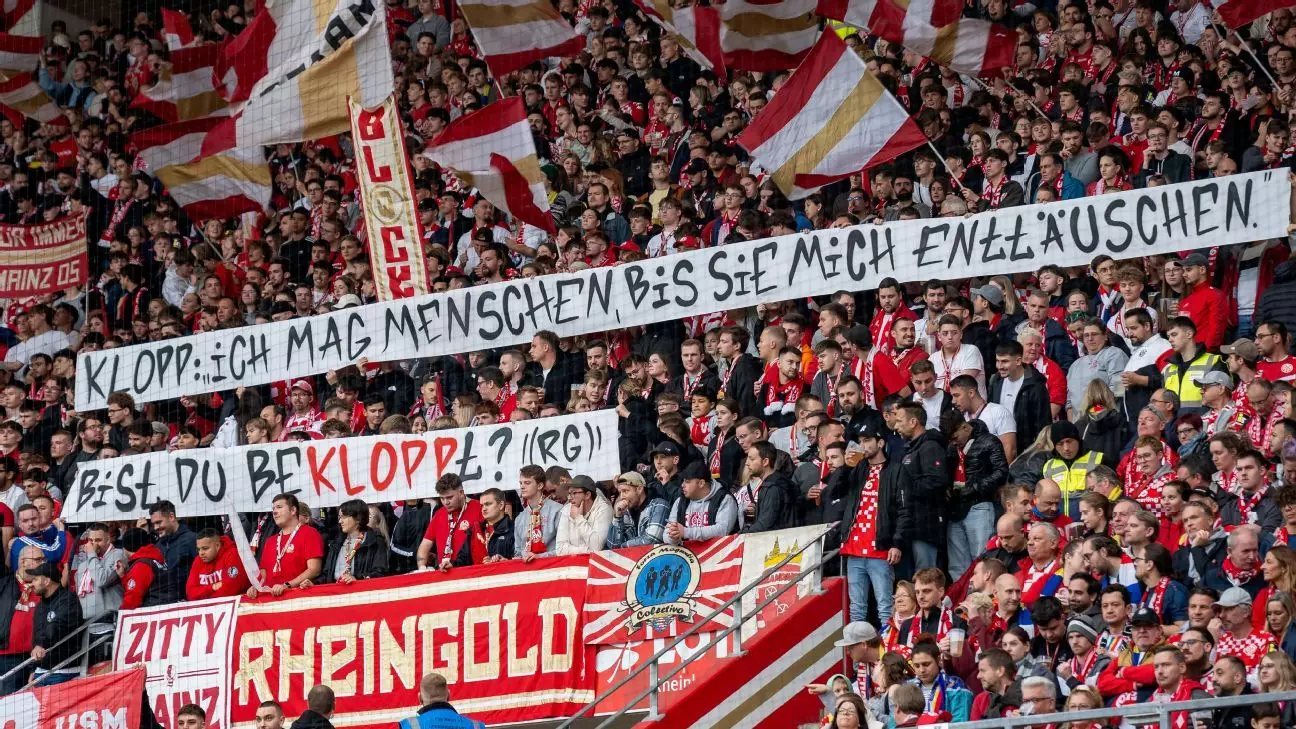Jürgen Klopp, a name that has become synonymous with passion and success in football, has found himself at the center of a storm following his recent decision to take on a prominent role at Red Bull’s global football division. Once reverently regarded by fans of his former club Mainz, the reception to his new venture has been anything but warm. During a Bundesliga match against RB Leipzig—another team backed by Red Bull—supporters unfurled banners expressing their discontent. One particular message lamented, “Have you forgotten everything we gave you?” This criticism reflects not merely disappointment but a sense of betrayal felt by fans who once idolized him.
The Weight of Nostalgia
Mainz supporters remember Klopp with affection due to his 18 years of dedicated service as both player and coach. His emotional departure from the club in 2008 was marked by a heartfelt farewell that resonated deeply with fans—a moment that solidified his legendary status at Mainz. Now, many are questioning whether he has abandoned those roots for corporate gains. The juxtaposition of Klopp’s past loyalty to his former club against his new affiliations with a company like Red Bull, known for its commercialization of sports, is striking. The irony of his situation isn’t lost on his former supporters, who are grappling with a feeling of disillusionment.
The implications of Klopp’s new role expand beyond Mainz. As he steps into the position of head of global football, he will oversee a wide-ranging network of clubs, including RB Leipzig, RB Salzburg, and New York Red Bulls. This presents a significant shift from his previous coaching endeavors, where individual club identities took precedence over corporate branding. The strategy employed by Red Bull raises questions: can such a corporate model maintain the unique cultural and competitive integrity of each club? Klopp’s involvement suggests a convergence of commercial interests and football management, leading many to wonder if this is a sustainable model or simply a trend driven by financial motives.
Klopp’s career reflects an admirable trajectory filled with triumphs, from Borussia Dortmund to Liverpool, where he achieved unprecedented success. However, his move to Red Bull poses an ethical dilemma: the tension between ambition and loyalty. As he embarks on this new chapter, Klopp must navigate scrutiny from fans and the media, challenging him to justify his choices in a sport where passion often battles with profit. The quotes displayed by Mainz fans—”I like people until they disappoint me”—resonate particularly in this context, suggesting that the bar for loyalty has become higher in the eyes of many.
Jürgen Klopp’s transition to Red Bull not only highlights the complexities of modern football but also serves as a reminder of the emotional connections that define the sport. While he might pursue new avenues of success, the fallout from this decision reminds us that loyalty, once questioned, can lead to a painful rift between a player and their supporters. As Klopp forges ahead in this multifaceted role, he must reconcile his past with an uncertain future, striving to maintain the passion that once endeared him to millions while operating in an increasingly commercialized environment.
